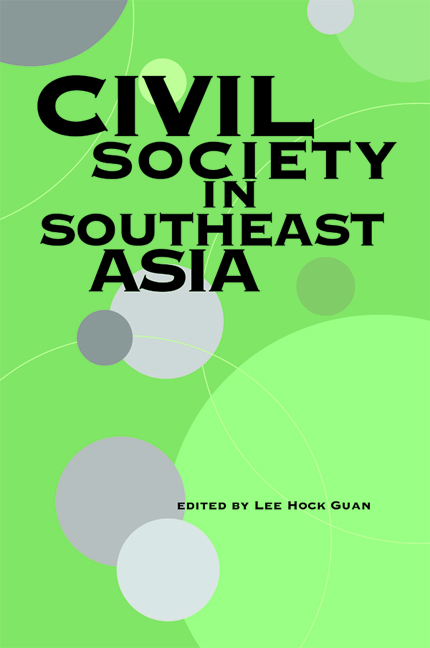Book contents
- Frontmatter
- Contents
- Preface
- About the Contributors
- 1 Introduction: Civil Society in Southeast Asia
- 2 Islam, Constitutional Democracy, and the Islamic State in Malaysia
- 3 Cracks in the Wall of Separation?: The Church, Civil Society, and the State in the Philippines
- 4 New Buddhism, Urban Space, and Virtual Civil Society
- 5 Women's Movement in the Philippines and the Politics of Critical Collaboration with the State
- 6 Participation of the Women's Movement in Malaysia: The 1999 General Election
- 7 Civil Society Effectiveness and the Vietnamese State — Despite or Because of the Lack of Autonomy
- 8 Relationship between State and Civil Society in Singapore: Clarifying the Concepts, Assessing the Ground
- 9 Civil Society in Malaysia: An Arena of Contestations?
- 10 Ethnicity and the Civil Rights Movement in Indonesia
- 11 Civil Society Discourse and the Future of Radical Environmental Movements in Thailand
- Index
1 - Introduction: Civil Society in Southeast Asia
Published online by Cambridge University Press: 03 November 2017
- Frontmatter
- Contents
- Preface
- About the Contributors
- 1 Introduction: Civil Society in Southeast Asia
- 2 Islam, Constitutional Democracy, and the Islamic State in Malaysia
- 3 Cracks in the Wall of Separation?: The Church, Civil Society, and the State in the Philippines
- 4 New Buddhism, Urban Space, and Virtual Civil Society
- 5 Women's Movement in the Philippines and the Politics of Critical Collaboration with the State
- 6 Participation of the Women's Movement in Malaysia: The 1999 General Election
- 7 Civil Society Effectiveness and the Vietnamese State — Despite or Because of the Lack of Autonomy
- 8 Relationship between State and Civil Society in Singapore: Clarifying the Concepts, Assessing the Ground
- 9 Civil Society in Malaysia: An Arena of Contestations?
- 10 Ethnicity and the Civil Rights Movement in Indonesia
- 11 Civil Society Discourse and the Future of Radical Environmental Movements in Thailand
- Index
Summary
The concept of civil society has gained global popularity since its rediscovery by scholar-activists in Eastern Europe and Latin America in the 1970s that preceded the varying forms of democratization in the 1980s. A great many became enthusiastic proponents of civil society as it was deemed crucial for improving the quality of governance, strengthening people power, enabling development, and — above all — promoting democratization and strengthening democracy. Indeed, the idea that civil society is the key to creating and sustaining a healthy democratic polity came to dominate the political and development discourses.
As the concept gained widespread acclaim, it resulted in the emergence of a wide array of meanings of civil society which, understandably, stirred up fears that the concept has “flattened out to such an alarming extent that it loses its credibility” (Chandhoke 2001, p. 1). The concept's popularity itself thus contributed to “a problem of indeterminacy” (Kaviraj and Khilnani 2001, p. 1). Exasperation with the fact that the concept embraces so many dissimilar meanings that it is contradictory and muddled led some to question the usefulness of the concept (Kumar 1993). Regrets over the loss of conceptual clarity should not, however, lead one to think that the concept once had, or that it can have, a clear definitive meaning. This is largely because the meanings of civil society have always been indeterminate and numerous past attempts to pin it down have only generated more contestations.
The reason why civil society defies any clear definitive meaning is that it has all the hallmark characteristics of an “essentially contested concept”: the concept has descriptive as well as normative dimensions, and thus its usage is subject to intense and endless debate. Two attractive features of the concept that make it popular also contribute to making its usage more contentious. One, the civil society concept is complex and open in character and as such can be readily modified so as to be applicable to a broad variety of intentions and situations. Two, the concept has considerable appeal because it “embodies for many an ethical ideal of a social order, one that, if not overcomes, at least harmonizes the conflicting demands of individual interest and social good” (Seligman 1992, p. x). Thus despite the numerous discussions of and publications on the concept, no universally agreed upon definition of civil society is ever likely to prevail.
- Type
- Chapter
- Information
- Civil Society in Southeast Asia , pp. 1 - 26Publisher: ISEAS–Yusof Ishak InstitutePrint publication year: 2004

